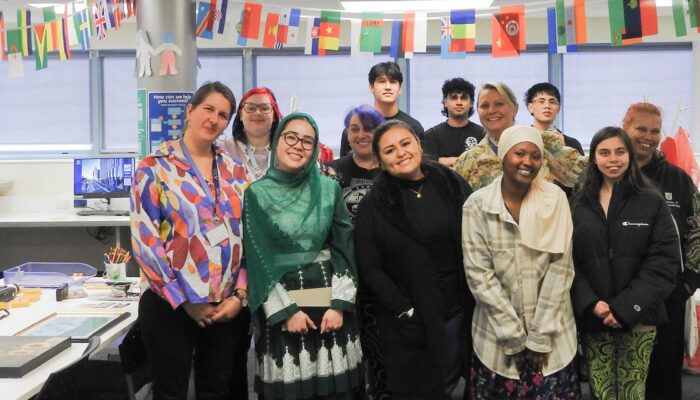How can universities better support refugee background students?
Access to educational opportunities is crucial for students from refugee backgrounds, as it facilitates effective integration into their host country and enhances their employment prospects. This ultimately contributes to a stronger sense of belonging and better health outcomes. While there has been considerable concern amongst educators about how to best promote academic success among refugee-background learners, higher education establishments have been slow to tailor supports to the specific needs of refugee students or improve their retention and progression in higher education.
A recent example of a university program that incorporates additional initiatives to support meaningful engagement of refugee background students comes from University of South Australia’s (UniSA) College. UniSA College Refugee Student support group initiatives have been developed to enhance refugee background students’ participation at university and to help address the unique challenges they face. These efforts have led to better engagement and retention of this student cohort.
UniSA College Refugee student support group is a peer-support initiative established in 2019 and enabled by funding from a Federal Fostering Integration Grant (Department of Home Affairs). In 2019, UniSA College utilized the grant funding to initiate the Refugee Student Support Group employing Peer Support Officers. This initiative aligns with existing research that emphasises the value of accessible, face-to-face peer services in supporting students’ academic and language development, as well as their social and cultural networking.
The project has remained sustainable since 2019 and has led to recruitment of Peer Support Officers who provide support for refugee background students enabling their successful transition into University. The Peer Support Officers also contribute to the planning, development and implementation of early intervention strategies for refugee students identified as at risk, in collaboration with key stakeholders across the University. The group is led by Student Success Coordinator Teresa Thái and Senior Lecturer, Dr Snjezana Bilic.
Project co-lead Teresa Thai accentuates peer support as one the best aspects for student support: ‘Supporting peers as they assist one another and celebrating the rich cultural diversity at our College is profoundly rewarding. Mentoring and employing the next generation of community leaders is both a joy and an investment in a brighter future’.
The Peer Support Officers recruited in 2024, Shikeba Mohammadi and Go Pau outline: The best aspects of the project in terms of student engagement were its emphasis on personalized, hands-on learning and its ability to create real-world connections for students’.
Throughout 2024 and in early 2025, the Refugee Student support team organised a series of workshops and events including two employability workshops and Celebrating Cultural Diversity exhibition. The workshops employability were informed by the National Project on Culturally responsive Graduate capitals led by A.Prof Sally Baker. This initiative focuses on helping CALM (culturally and linguistically marginalised students) develop job-ready graduate skills. Existing research outlines that CALM students experience acute disadvantage in post- graduation employment outcomes.
Peer Support Officers Shikeba and Go praised the outcome of the employability workshops for students, outlining how essential they are for students to think about their future career options but also for students to develop employability skills:
This interactive approach (of employability workshops) encouraged deep learning, as students could directly apply techniques into their resumes and LinkedIn profiles. The opportunity to practice elevator pitches and engage in discussions about real-world networking strategies further helped students build confidence and directly enhance their professional skills, making the workshops both practical and relevant’ (Peer Support Officers, 2024)
‘Celebrating cultural diversity’ exhibition event, delivered in 2024 and 2025, was also successful, engaging students and staff, promoting an appreciation for cultural diversity and fostering a sense of inclusion within UniSA College. Many students brought cultural artifacts and food from their countries of origin.
Peer Support Officers emphasised that one of the best aspects of the event was creating an opportunity for students to explore and celebrate diverse cultural traditions:
Students participated in dynamic conversations with peers and staff, sharing personal stories and learning about different global customs. A key highlight, many of the students brought cultural ornaments, sparking curiosity and created a rich dialogue that deepened participants’ cultural understanding. The informal setting encouraged students to connect and exchange stories, fostering a sense of community and inclusivity. The event concluded with a group photo, symbolizing the students’ collective embrace of diversity and strengthening their relationships. This collaborative atmosphere left students with a deeper appreciation of cultural differences and a stronger sense of belonging within the UniSA College community’ (Peer Support Officers, 2024).
Academic lead of the project Dr Snjezana Bilic highlights how important sense of belonging is for all students at university. For refugee background students especially, these initiatives foster a sense of community and inclusion. This is particularly important in light of the 2024 report by the South Australian Children and Young People’s Commissioner on ‘everyday racism,’ which highlights the prevalence of racism experienced by many young people from refugee backgrounds across various societal contexts. The report recommendations are: ‘that we do all we can to ensure children and young people from refugee and migrant backgrounds feel safe and included at school, in sports clubs and in the community’.
The positive impacts of the Refugee Student Support Group on the student learning experience and retention have been documented in Bilic and Thai (2023) publication.
